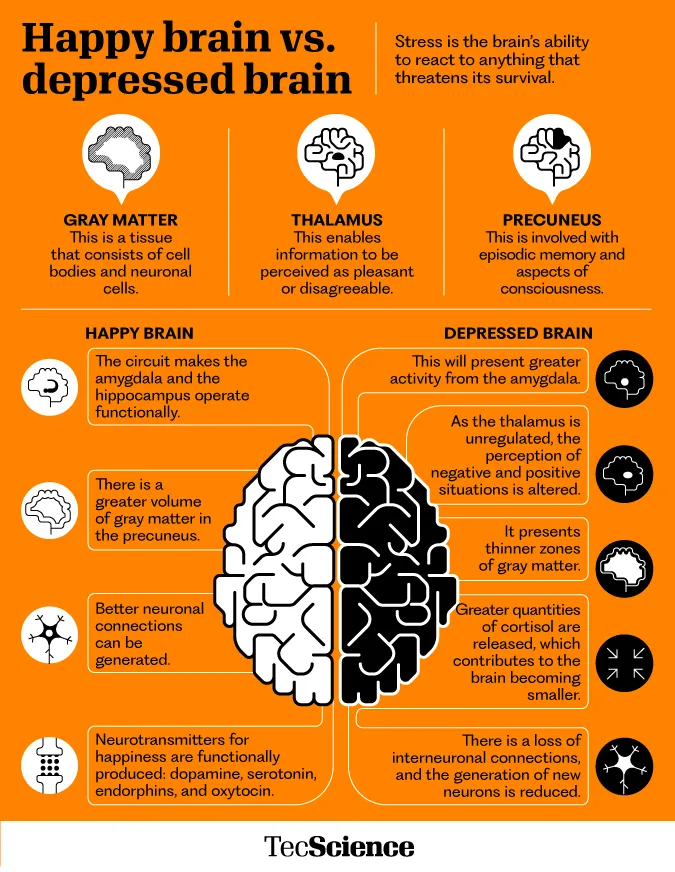The Organization for Economic Co-operation and Development (OECD) estimates that mental and emotional disorders cost the global economy between 2.5 billion and 8.5 billion dollars a year in lost productivity.
Taking care of employees also means taking care of mental health at work because unnecessary stress factors lead to illnesses like anxiety and depression and even strokes and heart attacks.

Having a “decent job” is a human right, in which the development of one’s abilities is dignified and allowed, it is carried out with respect for fundamental labor principles and rights and allows a fair income without discrimination. (Illustration: Nora Muñoz / TecScience)
How stress affects the brain
Leonel Cantú Martínez, a neurologist at the TecSalud Institute of Neurology and Neurosurgery, explains that brain health is a fundamental parameter for the patient’s wellbeing due to the impact it has on both emotional and organic diseases.
“The economic impact of job stress is very high, but in addition to impacting the nervous system, stress chronically damages organs and reveals the emotional impact of disorders that affect us at any age,” he says in an interview with TecScience.
When the activity of the amygdala (part of the brain’s emotional system) increases due to the generation of excess cortisol, the brain becomes smaller and fewer neural connections are made, which is why stress reduces people’s ability to learn and remember information.
Although the pituitary gland (or hypophysis), located at the base of the brain, indicates the amount of cortisol to be released, the hormone is actually produced in the adrenal glands, which are located on top of the kidneys. Cortisol is a natural corticoid, which means that it has anti-inflammatory and immunosuppressive properties; for example, it balances glucose levels and controls blood pressure.
However, when excessive amounts flood the brain, it functions as a neurotransmitter that puts the brain’s emotional system on high alert.
Ricardo Caraza Camacho, psychiatrist and head of TecSalud’s Psychiatry and Mental Health Service, explains that hippocampal shrinkage is observed in stressful situations, such as post-traumatic stress in structural magnetic resonance imaging studies.
“Stress may have a negative effect on our nervous system and brain, while excess cortisol is capable of damaging the hippocampus, a structure involved in memory functions.”
The hippocampus is a structure in both hemispheres of the brain: left and right.
It is involved in memory, emotional regulation, hearing, and control of movement in a given space. In addition, it is part of the limbic system that is responsible for regulating thirst and appetite, response to pain and pleasure, sexual satisfaction, as well as anger and aggression.
The World Health Organization (WHO) says that decent work is good for mental health; this implies that work environments should be adequate and that discrimination and inequality, excessive workloads, exiguous job control, and job insecurity should not be tolerated.
The Instituto de Ciencias del Bienestar Integral de Tecmilenio (Tecmilenio’s Institute of Integrated Wellbeing Sciences) is aware of the importance of mental health at work and promotes positive leadership tools to encourage the creation of healthy workplaces.
Rosalinda Ballesteros, the director of this institute, says that Tec has been studying the impact of happiness on productivity for the past ten years. “We realize that we can intentionally influence how the brain works to generate processes that lead to increased work engagement and more wellbeing in professional environments.”

Infographics: Oldemar González / TecScience
What is brain economy?
Mental and emotional health is important, especially as the pandemic has prompted governments to reflect on the so-called brain economy, which involves valuing brain capital as an important business asset.
The brain economy puts the spotlight on human brain abilities. Characteristics such as self-control, emotional intelligence, creativity, compassion, altruism, systems thinking, and cognitive flexibility are some of the most representative. According to the OECD, these skills are critical in a digital economy highly dependent on good brain health.
Stress is the capacity of the human brain to react to threats to its survival. It is subjective because everyone perceives it differently. However, there are particular situations that tend to increase our predisposition to stress, such as lack of sleep, excessive working hours, or unhealthy lifestyles.
For instance, according to reports published by the WHO and the International Labor Organization (ILO), working 55 or more hours a week increases the risk of suffering an adverse cardiovascular event by 35%, while working 35 to 40 hours a week increases the risk of death from ischemic heart disease by 17%.
One consequence of a stressed brain is the disconnection of the orbitofrontal area, a region linked to decision making. The circuitry associated with emotion regulation and memory is also shut down.
This supports why people working under a lot of stress will see their work and health negatively affected due to increased levels of aggressiveness and toxicity in their bodies.
Moreover, work stress may lead to a poor diet and increased cholesterol levels, as is the case with other negative habits like sedentary lifestyles and smoking, which are factors that may cause cerebral infarction.

Infographics: Oldemar González / TecScience
The happiness stimulus
Brain economy in organizations means a reduction in heart attacks and strokes, obesity and addictions, depression, and anxiety disorders, as well as chronic stress and burnout syndrome.
“In these positive environments, people suffer less burnout and less fatigue. They can deal with greater levels of challenge, and have a better organizational climate, which has to do with the organization’s ability to include these resources and behaviors that generate positive environments in its processes and organizational culture,” explains Ballesteros.
According to data from the consulting firm Gallup and the McKinsey Health Institute disseminated by Tec Institute, the benefits of positive leadership strategies and healthy work environments are 66% fewer sick days, a 55% reduction in staff turnover, 41% in absenteeism from work, 40% in defective output, and 125% less likelihood of burnout.
By monitoring brain activity, researchers have discovered that happy brains enjoy better communication between cerebral hemispheres due to more gray matter being produced at that junction. This smooth functioning has a direct impact on people’s creativity and productivity.
The neurologist Leonel Cantú explains that studies have been conducted to try and identify what happens when subjects receive a happiness stimulus.
“The precuneus anatomical area in the middle of the brain has cognitive and emotional functions that connect ideas. This study showed that this anatomical structure grows or is growing in patients who respond more positively to happiness. This demonstrates that there is an increase in the gray matter associated with happier people,” explains TecSalud’s neurology expert.
Ricardo Caraza adds that it is possible to observe how the brain shuts down its anxiety and survival circuits in harmonious, stress-free environments.
“We can perform a functional MRI to observe certain changes that take place when you are happy. We are going to find shrinkage in the areas that monitor our environment and cause us to react to dangerous situations,” says Caraza.
According to the WHO, a better work environment can be created through leadership and commitment, for example, by integrating mental health into labor policies (making mental health and employment services available to companies with fewer resources), aligning labor laws and regulations with international human rights instruments and implementing non-discrimination policies at work.

Infographics: Oldemar González / TecScience








